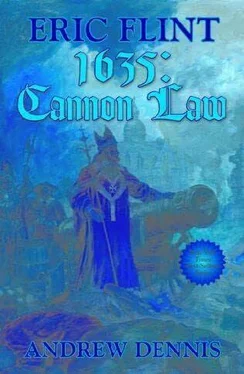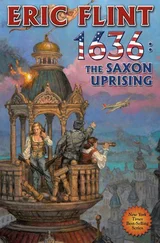Eric Flint - 1635 - The Cannon Law
Здесь есть возможность читать онлайн «Eric Flint - 1635 - The Cannon Law» весь текст электронной книги совершенно бесплатно (целиком полную версию без сокращений). В некоторых случаях можно слушать аудио, скачать через торрент в формате fb2 и присутствует краткое содержание. Жанр: Альтернативная история, на английском языке. Описание произведения, (предисловие) а так же отзывы посетителей доступны на портале библиотеки ЛибКат.
- Название:1635: The Cannon Law
- Автор:
- Жанр:
- Год:неизвестен
- ISBN:нет данных
- Рейтинг книги:3 / 5. Голосов: 1
-
Избранное:Добавить в избранное
- Отзывы:
-
Ваша оценка:
- 60
- 1
- 2
- 3
- 4
- 5
1635: The Cannon Law: краткое содержание, описание и аннотация
Предлагаем к чтению аннотацию, описание, краткое содержание или предисловие (зависит от того, что написал сам автор книги «1635: The Cannon Law»). Если вы не нашли необходимую информацию о книге — напишите в комментариях, мы постараемся отыскать её.
1635: The Cannon Law — читать онлайн бесплатно полную книгу (весь текст) целиком
Ниже представлен текст книги, разбитый по страницам. Система сохранения места последней прочитанной страницы, позволяет с удобством читать онлайн бесплатно книгу «1635: The Cannon Law», без необходимости каждый раз заново искать на чём Вы остановились. Поставьте закладку, и сможете в любой момент перейти на страницу, на которой закончили чтение.
Интервал:
Закладка:
He'd had to get Father-now Cardinal-Mazarre to explain what paranoia was, and had observed that it sounded like a perfectly healthy reaction to living and working in the top ranks of the Church. Indeed, it was those who were not paranoid who were unhealthy, or at least very soon would be.
Mazzare had chuckled, and told Barberini the old, to him at least, joke about the king who had brooded "I'm paranoid, but am I paranoid enough?" Another text for these times.
But His Holiness had nodded permission for Borja to speak.
"I thank Your Holiness," the Spanish inquisitor said, "And I would beg clarification of certain matters which I and, I fear, his most Catholic Majesty, view with no little alarm."
Barberini winced. As subtle as a joke about farting. As blatant as a street-corner whore. There was this to be said about Rome's infighting: it weeded out the dullards. Spain, on the other hand, had to find jobs for its teeming and indefatigably inbred nobility, and some of them rose to damnably high levels.
Borja cleared his throat. "Your Holiness," he went on, "has in particular elevated enemies of the church to the rank of cardinal."
That brought an intake of breath from half of the cardinals present. There had been three new cardinals in the last year-Mazzare, Cardinal Protector of the new United States of Europe, Mazarini in France, at Richelieu's behest and almost certainly another of Richelieu's attempts to preempt history with an early appointment, and LeClerc, the former "Father Joseph" and another of Richelieu's creatures.
Barberini wondered if it was worth parsing that. Enemies, plural? All of them or just the two who formed a definite group? Or just the one, and Borja was being as ham-fisted as he usually was with his rhetoric?
"In particular," Borja was saying, "there are those who have actively supported the chiefest of the Church's enemies in the north. All, in fact, of Your Holiness's recent appointments to the purple-"
The pope had raised a hand for silence. "If Your Eminence will pause for a moment?"
Borja nodded assent, and, a palpably false smile on his face, resumed his seat.
Urban VIII cleared his throat. "We are advised that there is obstinate doubt of Our policy." Another intake of breath, this time from nearly everyone present.
Barberini included. That was the form of words used in the technical definition of heresy, a most serious charge to lay against anyone, let alone a prince of the church and an inquisitor. Small wonder that there was shock. For a pope, the absolute head of the Church, Urban was known to be a genial man, little given to outright confrontation where it could be avoided. What was causing him to deliver such an obvious slap in the face to his most blatant critic?
"Let it be known," Urban went on over the sudden and urgent whispering, "That We are saddened by the disputes among the secular princes of Christendom. As Common Father of all Catholics, We are particularly saddened by the practice of princes, a practice which has become common, of one accusing the other of being an enemy of the Church. What is enmity to the Church is for Us to decide, and no other."
That provoked another hiss, this time-Barberini was watching carefully-from the Spaniards. The decision as to who, within the dominions of His Most Catholic Majesty, was an enemy of the Church, was arrogated exclusively to the Spanish Inquisition. So it had long been, and doubtless they wished it to remain so for ever. Although the reference could be taken to mean Maximilian of Bavaria, whose pronouncements concerning the rulers of surrounding territories and, indeed, the papacy were sounding more and more lunatic as time went by.
This time Urban waited for the disturbances to die down before speaking again. "We are also minded to consider that the practice of winning souls for the Church is a matter for the Church, and not for secular princes to attempt by wager of battle. We are, however, not yet minded to make any pronouncement ex cathedra."
The silence that followed was profound. The subtlety of curial proceedings had been abandoned by both Borja and his nominal master. The House of Habsburg had been a prime proponent of the principle of cuius regio, eius religio, and to address such a remark as that in response to the ranking cardinal of the Habsburg party present was as direct a rebuke as could have been delivered without naming names. It was, Barberini realized, only to be expected when dealing with Borja, who had all but had to be beaten over the head with the encyclical ordering him to leave Rome before he would go.
Borja had risen to his feet, his usually ruddy complexion gone an even darker shade of red. "Your Holiness then does not support the winning of souls for the Church?"
Urban raised his hand in an admonitory gesture. "We support the missionary work of Our clergy, and no other means of winning converts. If this must be in territories where the government is opposed to Us, We observe that the Church has never wanted for brave souls called to the martyr's crown."
Borja's flush paled a little. Even he could pick the nuances out of that, Barberini realized. Not just territories opposed to the Church, but territories opposed to the papacy.
And then Barberini followed it all the way to the end. Was Urban expecting the worst, truly the worst, from Borja? A church of Spain, to join the church of England? Even an antipope in Madrid?
Barberini felt a shudder run down his spine. With Spain outside the church there would be no need for even nominal obedience to Rome, and the Papal States would be crushed. Even after her reverses, Spain was a power, arguably the power whatever the scientific wizardries of the USE could achieve. The resistance the Papal States could offer would be a token at best against an army that had lost but one battle in the last century. Was the martyr Urban referred to himself? Barberini looked around the room and saw a lot of faces growing very thoughtful indeed.
Not least Borja's. Doubtless he had expected a less forthright response, not a flat declaration of the pope's willingness to resist from the first. If the papacy entered into outright defiance, Spain's isolation would be complete, with their cousins in Austria already adapting to the new way of doing things and their king's brother asserting his independence. "Your Holiness…" he said, and paused.
"We thank you for this opportunity to make known Our thoughts on this matter," Urban said. "And We would further be grateful if Your Eminence would recall the words of our encyclical on the subject of cardinals remaining in their Sees. It is there that the missionary work of the Church goes on, and there that We depend on Our cardinals to oversee that work."
Borja remained silent. Barberini stared hard, and fancied he could see Borja's lips moving silently, although a casual glance would see the grinding jaw of a very angry man. Whatever prepared script he had had, he had clearly been diverted from it.
From behind Barberini, a whisper from Ciampoli, "We should plan for worse things from Borja, I believe."
Barberini waved him to silence, irritably. This would have to be thought over very carefully. It was far from necessary for his uncle to take his most junior cardinal into his most secret counsels, but surely some warning of so radical a response to Borja's machinations would have been sensible?
On the floor, Borja was still silent, and had been for nearly a minute. Everyone present was watching him carefully. The next words from the Spanish cardinal would, potentially, decide great matters in the life of the Church. Even, in a very real sense, how much life the Church might have left in it, for Urban had presented Borja-and by extension Borja's masters in Madrid, assuming they knew and approved of what he was doing, by no means a foregone conclusion-with a vision of the Church in ruins if Spain acted against the papacy.
Читать дальшеИнтервал:
Закладка:
Похожие книги на «1635: The Cannon Law»
Представляем Вашему вниманию похожие книги на «1635: The Cannon Law» списком для выбора. Мы отобрали схожую по названию и смыслу литературу в надежде предоставить читателям больше вариантов отыскать новые, интересные, ещё непрочитанные произведения.
Обсуждение, отзывы о книге «1635: The Cannon Law» и просто собственные мнения читателей. Оставьте ваши комментарии, напишите, что Вы думаете о произведении, его смысле или главных героях. Укажите что конкретно понравилось, а что нет, и почему Вы так считаете.











